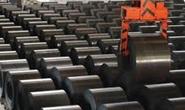Overseas

January 15, 2015
World vs. Domestic HRC Price Spread at 10 Month Low
Written by Brett Linton
The spread between world hot rolled export pricing and that of the domestic average here in the United States is shrinking based on our analysis of steel pricing data from this week. As the spread shrinks, the competitiveness of imported steel into the United States is reduced. Over time, if the trend continues, the domestic (U.S. and Canada) steel mills will be in a better position to regain some of the market share lost to foreign steel imports, especially on flat rolled steel products in the coming months (second half 2015).
![]() The following calculation is used by Steel Market Update in order to identify the spread between world hot rolled export prices as determined by SteelBenchmarker and domestic (USA) hot rolled prices. SMU compares the world hot rolled export price to which adders are added for freight, handling, trader margin, etc. This is then compared to the spot (FOB Mill) domestic hot rolled price using the SMU Hot Rolled Index average for this week with the result being the spread between domestic and world HRC pricing.
The following calculation is used by Steel Market Update in order to identify the spread between world hot rolled export prices as determined by SteelBenchmarker and domestic (USA) hot rolled prices. SMU compares the world hot rolled export price to which adders are added for freight, handling, trader margin, etc. This is then compared to the spot (FOB Mill) domestic hot rolled price using the SMU Hot Rolled Index average for this week with the result being the spread between domestic and world HRC pricing.
The world export price for hot rolled bands is at $448 per net ton ($494 per metric ton) FOB the port of export according to data released by SteelBenchmarker on Monday of this past week. This is down $7 per ton from the previous release in late-December and down $9 per ton from early-December.
SMU uses a minimum of $70 to as much as $100 per ton which is then added to the export number in order to get the steel to ports in the United States (freight, handling, and trader margin). This additional cost more closely mirrors the “true” world HR export price ranging from $518 to $548 per ton CIF USA Port (SMU Note: we have heard the most recent offers for hot rolled coil are running from $500 to $540 per ton, CIF Duty Paid, Houston).
The latest Steel Market Update hot rolled price average is $570 per ton for domestic steel; this is down $30 from late-December and down $45 per ton from early-December. The theoretical spread between the world HR export price and the SMU HR price is $22 to $52 per ton ($122 prior to import costs), down $23 per ton from our previous analysis and down $36 from early-December.
The $22 to $52 spread is the lowest seen since mid-March 2014 when we had a spread of $15 to $45 per ton ($115 prior to import costs). Over the summer we reached a spread of $84 to $114 per ton ($184 prior to import costs) in mid-May. One year ago the spread was $59 to $89 per ton ($159 prior to import costs).
Looking at actual new foreign offers of $500 to $540 per ton, the spread is $30 to $70 per ton. When taking into consideration that the domestic $570 is just an average and the lower end of the range is $550 per ton, then the spread shrinks to $10 to $50 per ton. We have found that most buyers will stay domestic when spreads on hot rolled are less than $60 per ton (and freight is not an issue).
Freight is an important part of the final determination as to whether to import foreign steel or buy from a domestic mill supplier. Domestic prices are referenced as FOB the producing mill while foreign prices are FOB the Port (Houston, NOLA, Savannah, Los Angeles, Camden, etc.). Inland freight from either a domestic mill or from the port can dramatically impact the competitiveness of both domestic and foreign steel.
Below is an interactive graph which you can use to compare world HR export prices against the SMU domestic HR average price. We also have included a comparison with freight and traders’ costs added which gives you a better indication of the true price spread. You will need to read this article on our website in order to see and interact with the graphic. If you need assistance with either logging in or navigating the website, please contact our office at 800-432-3475 or info@SteelMarketUpdate.com.
{amchart id=”130″ Domestic vs. Foreign Hot Rolled Pricing- Steel Benchmarker World China Europe Prices}






